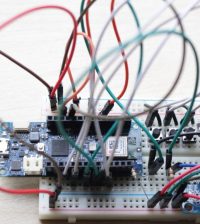- makeITcircular 2024 content launched – Part of Maker Faire Rome 2024Posted 2 weeks ago
- Application For Maker Faire Rome 2024: Deadline June 20thPosted 2 months ago
- Building a 3D Digital Clock with ArduinoPosted 7 months ago
- Creating a controller for Minecraft with realistic body movements using ArduinoPosted 7 months ago
- Snowflake with ArduinoPosted 8 months ago
- Holographic Christmas TreePosted 8 months ago
- Segstick: Build Your Own Self-Balancing Vehicle in Just 2 Days with ArduinoPosted 8 months ago
- ZSWatch: An Open-Source Smartwatch Project Based on the Zephyr Operating SystemPosted 9 months ago
- What is IoT and which devices to usePosted 9 months ago
- Maker Faire Rome Unveils Thrilling “Padel Smash Future” Pavilion for Sports EnthusiastsPosted 10 months ago
Aposema: Amazing 3D Printed Mask that Reacts to your Emotions

Soft robotics is a new area for many people. The idea of making soft robots out of soft parts could potentially bring about an entirely new way of constructing robots.
Aposema is a 3D printed soft robotics project by three architects: Silvia Rueda, Sirou Peng, and Adi Meyer. They’ve made a project that illustrates what soft robotics is and what one can do with it, and given people the instructions on how to do this at home. This will be a great tool in helping people make their own soft robotics at home.
The team made a personalized silicone mask that responds to your facial expressions.
They used Agisoft to scan the face, then used Zbrush to clean up the mesh. They then used Grasshopper and Rhino to make the pattern, then 3D printed out the molds. They then cast this in silicone using Smooth-On. Then they used an Arduino to read the muscle movements. The pumps then move fluid through depending on your expressions.
This is a fun illustration of what one could do with 3D printing and soft robotics.















